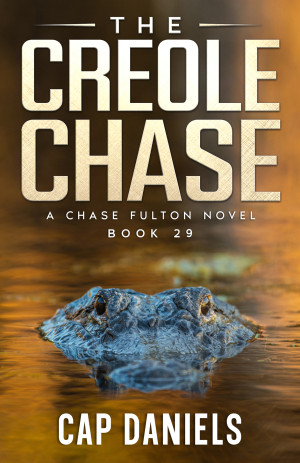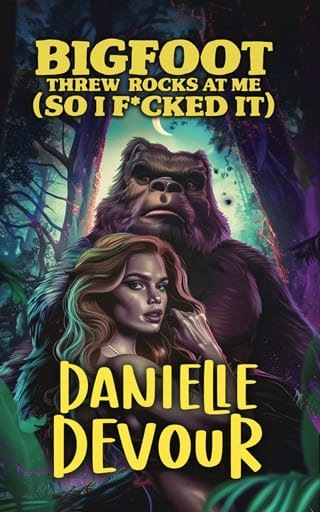Chapter 1 Man’s Work
Chapter 1
Man’s Work
Autumn 2013
“Why does dey calls you Gator, huh?”
The tough-as-nails young covert operative sat near the bow of the pirogue, a look of utter disbelief blended with a splash of fear on his bearded face. He turned to me as I tried to balance myself in the tiny boat beside his.
After getting my laughter under control, I said, “He wants to know why we call you Gator.”
The man sitting in the rear of Gator’s boat cocked his head, revealing a weathered face in testament to a life spent under the scorching sun on the bayous of South Louisiana. Most of his left hand was missing, and a jagged scar ran from his chin across his cheek and past the spot where his ear had once been. He raised the front of his filthy hat and stared at me through one eye as dark as the water in which we sat and another that was blue and milky and couldn’t tell light from dark. “Tell me one more ’gain what your name is, you.”
“I’m Chase Fulton.”
The old man roared with laughter and drove the only index finger he had left through the air at me. The appendage curved in more directions than any human finger should ever do, and his reaction was just as crooked. “Whoo! Dat der be some mo’ kinda gettin’-after-it kinda name. I gar-ohn-tee dat. Chase… Oh, my. Das one o’ dem der names o’ action. Is dat boy der gonna tells to me why e’rbody be callin’ him Gator?”
The look on Gator’s face grew even wilder as he silently pleaded for my help.
I said, “Tell him why we call you Gator.”
He seemed to gather himself and said, “Well, my real name is Clint Barrow, and I’m from Kansas—”
The old man interrupted. “Kansas? Ain’t never heards o’ no such place. Where dat be?”
“It’s in the Midwest,” Gator said.
The Cajun pulled off his hat, wadded it into a ball, and said, “Midwest… Does dat be over somewheres ’round Baton Rouge?”
Gator froze, and the old man burst into laughter and shook the pirogue like a carnival ride. “I’m just foolin’ ya, boy. I knows where Kansas be, and they fo’ sho don’t gots no gators up der.”
Gator shook his head. “No, sir. There are no gators in Kansas. That’s partially how I got the nickname. When I moved to Georgia with Chase and those guys, I saw my first alligator on the bank of the river. He wasn’t very big. Maybe four feet. Anyway, I remembered watching Steve Irwin on Crocodile Hunter . Remember that show?”
The man stretched his hat and pulled it back onto his head. “I seed a show one time up in N’awlins, but weren’t no gators in it, no, sir. Was some of dem Bourbon Street dancin’ girls a whirlin’ ’round and actin’ crazy. I seen that show but ain’t ne’er seen no crocodile-huntin’ show, me.”
Gator jerked his head toward me for an interpretation, but it was time for him to figure it out for himself.
He finally said, “Yeah, well, anyway. I jumped on the alligator because I thought it would be funny and give me a chance to prove to those guys that I wasn’t afraid.”
The Cajun raised what was left of his hand. “You best be ’fraid. Trust me on dat, you.”
“Yeah, I learned. That little alligator was a lot stronger than me, and he carried me into the river on his back. Any thought I had of proving how tough and brave I was went out the window. I was terrified, and I scampered out of the muddy water faster than I thought I could move. Ever since then, everybody calls me Gator.”
Watching a Cajun laugh is a show like none other, and the man in the boat brought down the house. The four visible teeth in his mouth were on full display until he broke into a fit of coughing, and I wondered if we were on the verge of attempting CPR in a tiny canoe on a blackwater bayou a thousand miles from everywhere.
Fortunately for us, and the old man, he survived the episode. When he finally caught his breath, he pulled a hand-rolled cigarette from his pocket, stuck it in his mouth, and struck a wooden match on the side of the pirogue. As the aromatic smoke rose above his head in a white plume, he said, “Dat sho’ nuff be one fine story, I do declare, me. So, let’s us go gets us one. What you say, you?”
I could see the wheels turning in Gator’s head, but he couldn’t put it together. The French-accented Cajun dialect is one of the most beautiful and melodic of all the American colloquial languages. Although I couldn’t read, speak, or even fully understand it, I’d grown fascinated with its beauty from the moment I met Cajun Kenny LePine, the son of the four-toothed man in the boat beside mine. Kenny owned the only heavy earth moving company in Camden County, Georgia. I made my home in that county, in the small town of St. Marys, on a gorgeous piece of property that had once been a pecan plantation called Bonaventure. The property was handed down through my mother’s family until it finally fell to me.
Bonaventure became not only home for my team of covert operatives, but also a world-class private tactical training facility to keep us at the top of our game. When an arsonist reduced my family’s ancestral home to ashes, Cajun Kenny LePine cleaned up the mess and dug the foundation for the house we then rebuilt. From that moment, I found—or made up—reasons to spend time with Kenny. Hearing him talk was only one of the many benefits of being in his presence. He possessed wisdom and common sense of the highest caliber, and I never failed to learn and laugh every time we were together.
His courtship and resulting marriage with a magnificent woman who was, in every way, beyond description, made my life better every time I saw the two of them together. His bride Earline, affectionately known as Earl by everyone who loved her, was the reason Gator and I were in a pair of tiny boats on that murky body of water, near a one-horse town I couldn’t pronounce, somewhere southwest of New Orleans.
Kenny LePine’s father was the four-toothed Cajun paddling Gator around, and if anyone asked his name, his answer was always “Keef Lap I Too,” which I assumed was his way of saying Kenny LePine, also.
Keeping my pirogue as close to his as possible gave me some unreasonable belief that I wouldn’t capsize my popsicle stick of a boat and that I wouldn’t be devoured by a swarm of hungry alligators.
“So, Mr. LePine, why did you need to talk to us?”
He lowered his chin and closed his one good eye. “You not ready to leave ol’ Keef already so soon is you, huh?”
“No, sir. I’m having the time of my life, but I’m starting to feel like we’re taking advantage of your hospitality. Earline told us you needed somebody to help you with a problem you couldn’t take care of yourself. So, if we can help, all you have to do is ask.”
He opened his eye. “That Earline better not o’ said no such thing. It ain’t that I can’t do it me-selfs. It just be bettah if somebody else be da one who done it ’cause the way I’d done be dunning it might put ol’ Keef back in da big house, don’tcha know.”
The look on Gator’s face said his head almost exploded, and mine wasn’t far behind.
I said, “We’re happy to help any way we can because you’re way too pretty for prison.”
He burst into another fit of laughter, laced with coughing, that ended in his crooked finger pointing into a clump of what we call “marsh grass” in coastal Georgia, but I have no idea what they call it in the bayou.
He said, “Der he go. Dat be a biggun, him. Get ready, boys. We’s gonna have our handses full wiff dis one, we.”
He paddled furiously until his pirogue slid against a length of nylon rope stretched taut. He grabbed the rope with his hand and a half and hauled it in as if his life depended on it.
“Get that gun o’ yous ready, boy. We ’bout to fine out if you is Gator or you is ain’t.”
Gator clearly understood that one, and he lifted the single-shot.22 from between his feet. Mr. LePine gave one final, mighty heave on the well-worn piece of rope, and an alligator’s head the size of a refrigerator popped out of the black water and thrashed with a violence I’d never seen. The pirogue turned into a bucking bronco, and Gator slammed the tiny rifle against his shoulder.
“Choot ’im in da brain, boy. Choot ’im!”
I’d watched Gator shoot a target the size of a cantaloupe at a thousand yards, so hitting an alligator two feet away should’ve been a cakewalk. But the sniper missed.
Mr. LePine shoved his crippled hand toward Gator. “Here, boy! Take dis here rope an’ don’ let go, no.”
Gator dug his heels into the bottom of the boat, grabbed the rope, and leaned back. Almost before he’d let go, Mr. LePine drew something from somewhere and drove it through the top of the alligator’s head until the thrashing ceased.
The dead alligator floated beside the boat, and Mr. LePine tucked away his tool. “I do hopes yous job ain’t chootin’, boy, ’cause you done misseded from that close. Is you any good at knittin’ or tendin’ to babies? ’Cause I ain’t sho’ you’s cut out for no man’s work, you.”
Gator relaxed and stared in wide-eyed wonder at the senior LePine. “Did you just kill an alligator with a knife?”
Mr. LePine drew the weapon again. “Nobody be a fool big enough to try killins a gator wiff a knife. What’s wrong wiff you, boy? Dis don’ be no knife. Dis here be a spike that my daddy done made a hundred years ago. Dis be all he had to give down to me when he pass on to dat big ol’ bayou up in Heaven, him.”
We tied the gator to the pirogue and paddled to what qualified as dry land in South Louisiana. It took all three of us to heft the monster into the bed of Mr. LePine’s ancient pickup truck.
Two hours later, the alligator was cleaned, and we had fifty pounds of gator meat—most of it from his tail.
I made two more attempts to get Mr. LePine to tell us what problem he needed us to solve, but he skillfully dodged the question. As the sun went down somewhere over Texas, Gator and I found ourselves in the backyard of someone whose name seemed to be Teton, but I couldn’t be certain. We were far from alone, but we appeared to be the only humans on Earth who spoke English.
Gator tapped the neck of his beer bottle to mine. “What planet are we on?”
I took a sip and did my best Cajun accent. “Me don’ know, me, but dem skrimps sho’ nuff be fine eatin’, dem.”
He rolled his eyes. “I wonder how far I’d have to walk to find somebody I can understand.”
I laughed. “You might find somebody in New Orleans, but probably not on Bourbon Street.”
He asked, “Is he ever going to tell us what he needs us to do?”
“I get the feeling that timing is everything down here. We’re their guests, and it would appear there’s some sort of protocol involving feeding us before asking us for anything.”
Before Gator had time to respond, a sound pierced the night air like nothing I’d ever heard. We spun to see a striking woman surrounded by five men under a collection of torches. Each of the men had an instrument. There was an accordion, a fiddle, a harmonica, a snare drum, and a washboard, and what resonated from those instruments was the most melodic sound I had ever heard. The gathered crowd paired off and danced as if the world were coming to an end at daybreak.
A woman who could’ve been eighteen, or perhaps forty, danced toward our table, took Gator by the hand, and dragged him toward what apparently qualified as a dance floor in the bayou. Nobody took my hand and dragged me anywhere, or perhaps Kenneth LePine II was dragging me into a scenario I probably couldn’t understand, but one I felt obligated to take for a spin.
It was challenging to define when one song stopped and the next began. The zydeco rhythm seemed to beat in time with the hearts of the people around me. In the short time I’d spent with them, it was obvious that their lives were physically demanding, but when the music played, so did they. Escaping the reality of their arduous daily grind brought their souls alive, but behind the dark eyes of men like Kenny LePine’s father lay an ancient beast not unlike the gators that patrolled and reigned supreme in the stifling depths of the bayou. Whatever those obsidian eyes were going to ask of me would be a task unlike anything I’d ever undertaken, but I believed it would be a mission I couldn’t turn down, no matter how sharp the teeth of our adversary.
The woman who abducted Gator delivered him back to his seat across from me, and she planted herself beside him, astride the bench. His breath was coming hard, and sweat rolled from his hairline.
The woman picked up a boiled crawfish from his plate and wiggled it through the air toward his face. “Why ain’t you eatin’ no mudbugs, you?”
He seemed to understand the words flowing from the lips of the beautiful young woman at his side, even though he spent the afternoon demanding that I interpret Mr. LePine’s patois.
He put on a sheepish smile. “I don’t really know how to eat them.”
“Oh, dat’s simple. Get you one in ’tween you big thumb and da next finger, like dis.” She held up the crawfish and separated its tail from its head, then she squeezed the meat from his tail and savored the taste of the spicey, sweet meat.
Gator followed suit and said, “Hey, that’s not bad.”
She giggled. “You think dat ain’t bad, just wait ’til you suck da head, you.” She held the crawfish’s head between her fingers and sucked the contents from the shell, then chased it with a swig of Gator’s beer. “Now you.”
He recoiled. “I don’t know. That’s not really…”
The woman sat his beer back on the table and took his face in her hands. She planted a long, passionate Cajun kiss on him and said, “Now, if you want more o’ that kind o’ lovin’, yous best be suckin’ dat mudbug head.”
Gator was rewarded for obedience to his Cajun queen, and she soon had him eating out of her hands.
She dabbed at the corner of his mouth with a well-used napkin. “What do you do, Boogaloo?”
Gator cocked his head. “Boogaloo? What does that mean?”
She cackled. “That’s you, Boogaloo. Dat’s what we coonasses call folks who is way offs down here in da bayou where you don’t belong, no.”
His confusion seemed to triple. “Coonasses?”
The woman’s laughter continued until she finally said, “You don’t know nothing, does you, Boogaloo? Dat’s me, a coonass. Just like e’rybody else ’cept you and him boogaloos.”
Suddenly, I was lumped into the boogaloo category with Gator, and although I didn’t understand it, I was okay with it.
Gator didn’t seem to share my acceptance of the moniker. “Wait a minute,” he said. “You call yourself a coonass, and everybody who’s not from here is a boogaloo?”
“Not e’rybody. There’s another mess o’ folks from N’awlins who be Creoles.”
“Ah, the plot thickens,” Gator said. “So, Cajuns are coonasses?”
She kissed the tip of his nose. “You catchin’ on, you.”
Gator shoved the plate of mudbug leftovers away. “Come on. You don’t really talk like that, do you?”
She leaned close and whispered, “I can speak your language just as well as you, but honey, you’re in the bayou, and down here, there’s only one language, and it sure ain’t English.”
“I knew it!” he said. “It’s all an act.”
“It’s no act, Sugar Britches. It’s what we are down here. Are you going to answer my question?”
“I don’t even remember your question,” he said.
“What do you do?”
“For work?”
“Yes, for work.”
He pointed to me. “I work for him.”
She leaned forward and directed her attention across the table. “Your employee over here doesn’t seem to know what he does for a living. Would you mind telling me?”
I wiped my mouth and took another swallow. “When people get themselves in situations they can’t get out of, we do what we can to help.”
“Lawyers?” she asked.
It was our turn to laugh. “No, we’re definitely not lawyers. You might even say we’re the opposite of lawyers. If we do our job right, whatever we’re dealing with never ends up in court.”
She took a moment and stared between the two of us. “Ah, so that’s why you’re here. You’re going to find out what’s going on with the dead bodies, aren’t you?”
 Fullepub
Fullepub 



